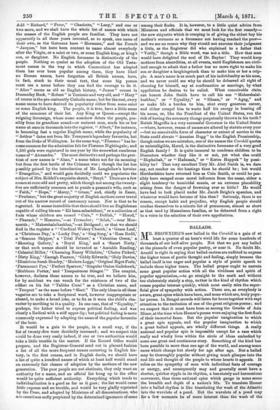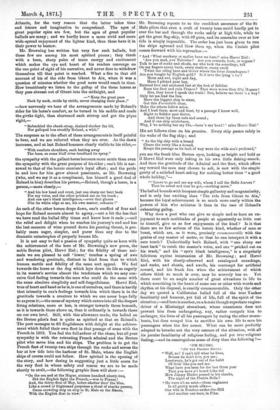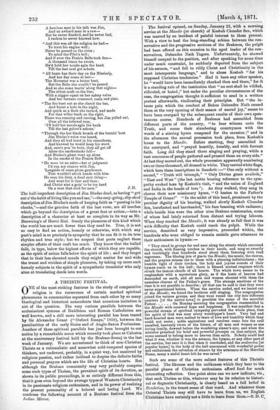BALLADS.
MR. BROWNING'S new ballad in the Conthill is a gain of at least a quarter of an hour's vivid life for some hundreds of thousands of our half-alive people. Not that we put any ballad at the pinnacle of even popular poetry, or near it. No doubt Mr. Arnold is right in saying that ballad-metres are unfitted to express the higher tones of poetic thought and feeling, simply because the ballad itself is too eager and popular a style of poetic speech to include those higher tones. The ballad proper ought to narrate some great popular action with all the vividness and spirit of popular appreciation, —to go straight to the mark and without too elaborately stately a step, rather in the kind of rhythm which rouses popular interest quickly, which most easily stirs the super- ficial glow of sympathy with action. There are, as everybody is aware, great epics which have been, and some which are, truly popu- lar poems. In Bengal crowds will listen for hours together with rapt attention to the recitation of one of the great religious poems ; and we suspect that it must have been so among the Greeks of Asia Minor, at the time when Homer's poems were enjoying the first flush of their immortal fame. But the popular imagination to which a great epic appeals, and the popular imagination to which a great ballad appeals, are wholly different things. A really national and popular epic is impossible except for a race which really and wholly lives within the circle of ideas embodied by some one great and continuous story. Something of the kind has been possible in more than one age of the world, and among some races which change but slowly for age after age. But a ballad may be thoroughly popular without giving much glimpse into the real life and thought of the people to whose hearts it appeals. It relies on the sympathy of men with individual feats of courage or energy, and consequently may and generally must have a shorter, quicker ripple in its rhythm, a less stately and harmonious movement, than those national epics which gauge in some sense the breadth and depth of a nation's life. To translate Homer into a ballad rhythm is like translating the wash of the Atlantic into the wavelets of a pond. But the wavelets of a pond may for a few moments be of more interest than the wash of the
Atlantic, for the very reason that the latter takes time I and leisure and imagination to comprehend. The ages of great popular epics are few, but the ages of great popular ballads are many ; and we hardly know a more vivid and more wide-spread enjoyment of the lighter kind, than these have it in their power to bestow.
Mr. Browning has written but very few such ballads, but these few are among his most spirited poems ; they throb with a keen, sharp pulse of tense energy and excitement which makes the eye and heart of his readers converge on the one point of sight of his narrative, and never dare to withdraw themselves till that point is reached. What a fire in that old account of his of the ride from Ghent to Aix, when it was a question of minutes whether the good news would reach in time. How breathlessly we listen to the gallop of the three horses as they pass abreast out of Ghent into the midnight, and —"Keep the great pace Neck by neck, stride by stride, never changing their place ;" —how nervously we hear of the arrangements made by Roland's rider for his horse's comfort, as he turned in his saddle and made the girths tight, then shortened each stirrup and got the pique right,— " Rebnekled the cheek-strap, chained slacker the bit, Nor galloped less steadily Roland, a whit."
The suspense as to the effect of these arrangements is itself painful to bear, and we are relieved when they are over. As the dawn
increases, and at last Roland becomes clearly visible to his rider,—
"With resolute shoulders, each butting away The haze, as some bluff river-headland its spray."
the sympathy with the gallant horse becomes more acute than even the sympathy with the great purpose of his rider ; one's life is nar- rowed to that of the heroic creature's loyal effort ; and the pride in and love for him grow almost passionate, as Mr. Browning (who, and we say it as a compliment, has himself a good deal of Roland in him) describes his person,—Roland, though a horse, is a person,—more closely,— " And his low head and crest, just one sharp ear bent back For my voice, and the other pricked out on his track ; And one eye's black intelligence,—ever that glance O'er its white edge at me, his own master, askance !"
As each of the other horses drops down, one's conflict of fear and hope for Roland mounts almost to agony,—not a bit the less that we have read the ballad fifty times and know how it ends ;—and the relief and delight when he reaches his journey's end and has the last measure of wine poured down his panting throat, is pro- bably more eager, simpler, and purer than any duo to the dramatic catastrophes of properly human life.
It is not easy to feel a passion of sympathy quite as keen with the achievement of the hero of Mr. Browning's new poem, the noble Breton pilot, nerve Riel ; for the fidelity of those ani- mals we are pleased to call lower,' touches a spring of awe and wondering gratitude, distinct in kind from that to which human mettle and fidelity of the same sort appeal. We feel towards the horse or the dog which lays down its life so eagerly in its master's service almost the tenderness which we may con- ceive God feeling towards the man who could do the same with the same absolute simplicity and self-forgetfulness. nerve Riel, true of heart and hand as he is, is one of ourselves, and there is hardly that intensity in one's feelings towards him which there is in the gratitude towards a creature to which we can never hope fully to express it ;—the sense of mystery which enters into all the deepest living relations, more or less, is stronger towards those beneath, as it is towards those above us, than it ordinarily is towards those on our own level. Still, with this allowance made, the ballad on the Breton pilot's feat is quite as spirited as that on Roland's. The poet manages to fill Englishmen with delight at the achieve- ment which foiled their own fleet in that passage of arms with the French in 1692. You feel the full ardour of the chase, but all your sympathy is with the retreating French admiral and the Breton pilot who saves him and his ships. The problem is to get the French fleet of twenty-two ships through the rocks and across the bar at low tide into the harbour of St. Maio, where the English ships of course could not follow. How spirited is the opening of the story, and how daring in suggesting just a little scorn for the very fleet in whose safety and rescue we are to be made shortly to exult,—the following graphic lines will show :— "On the sea and at the Hogue, sixteen hundred ninety-two, Did the English fight the French,—woe to France ! And, the thirty-first of May, helter-skelter thro' the blue, Like a crowd of frightened porpoises a shoal of sharks pursue, Came crowding ship on ship to St. Maio on the Rance, With the English fleet in view." Mr. Browning repeats to us the confident assurance of the St Malo pilots that even a craft of twenty tons could hardly get in over the bar and through the rocks safely at high tide, while to get the great flag-ship, with 92 guns, and its comrades over at low tide is simply impossible. The order has just been given to run the ships aground and blow them up, when the Croisic pilot comes forward with his reproaches :— "And 'What mockery or malice have we here?' cries Herve Riel: 'Are you mad, you Nfalouins? Are you cowards, fools, or rogues ? Talk to me of rocks and shoals, me who took the soundings, tell On my fingers every bank, every shallow, every swell 'Twixt the offing here and Greve where the river disombognes ? Are you bought by English gold ? Is it love the lying 's for ? Morn and eve, night and day, Have I piloted your bay, Entered free and anchored fast at the foot of Solider.
Burn the fleet and ruin France? That were worse than fifty Hognes! Sirs, they know I speak the truth! Sirs, believe tne there 's a way ! Only let me lead the line, Have the biggest ship to steer,
Get this Formidable clear,
Make the others follow mine, And I lead them, most and least, by a passage I know well, Right to Solider past Greve, And there lay them safe and sound ; And if one ship misbehave, Why, I 'ye nothing but my life,—here 's my head ! ' cries Herv6. Mel.'
His act follows close on his promise. Every ship passes safely in the wake of the flag ship ; and "As the big ship with a bound Clears the entry like a hound, Keeps the passage as its inch of way were the wide sea's profound,"
you see the frank blue Breton eyes, looking as bright and bold as if nerve Riel were only taking in his own little fishing-smack. And then the gratitude of the Admiral and the fleet, which offers any reward the man may choose to ask, is met with the simple gaiety of a satisfied heart asking for nothing better than "a good whole holiday, "--
" Leave to go and see my wife, whom I call the Belle Aurora !' That he asked and that he got,—nothing more."
The ballad bounds with buoyant simple gallantry and magnanimity, and is only less exciting than "Ile ride from Ghent to Aix,' because the loyal achievement is so much more easily within the powers of him who achieves it than in the case of Roland's exhausting gallop.
Why does a poet who can give so simple and so keen an en- joyment to such multitudes of people at apparently so little cost to himself, give us so few enjoyments of the kind ? Is it that there are so few actions of the heroic kind, whether of man or beast, which are, as it were, precisely commensurable with the genius of any master of metre, so that he can interpret it with a sure touch ? Undoubtedly both Roland, with "one sharp ear bent back" to catch the master's voice, and one " pricked out on his track," and his "eye's black intelligence," is a singularly felicitous equine incarnation of Mr. Browning ; and nerve Riel, with his closely-observed and catalogued soundings, and rocks, and shoals, and swells, his contempt for artificial reward, and his frank fun when the achievement of which others think so much is over, may be scarcely less so. Yet there must be an ample number of great situations in life to. which something in the heart of some one or other with words and rhythm at his disposal, is exactly commensurable. Only the other day we quoted a Californian ballad full of the true Yank familiarity and humour, yet full of life, full of the spirit of the situation ;—and here is another, on a heroic though reprobate engine- driver of a Mississippi steamboat, whose conscience does not prevent him from endangering, nay, rather compels him to endanger, the lives of all his passengers by racing the other steam- boats, but does compel him to sacrifice his own life to save his. passengers when the fire comes. What can be more perfectly adapted to breathe out the very essence of the situation, with all its jocular familiarity of religious feeling, and yet true religious feeling,—and its unscrupulous sense of duty than the following ?-
'JIM BLUDSO, "(OF THE PRAIRIE BELLE.)
"Wall, no! I can't tell whar he lives, &case he don't live, you see ; Leastways, he's got out of the habit Of livin' like you and me.
Whar have you been for the last three year
That you have n't heard folks toll How Jimmy Bludso passed in his checks, The night of the Prairie Belle ?
He were n't no saint—them engineers Is all pretty much alike—
One wife in Natchez-under-the-Hill And another one here, in Pike.
A keerless man in his talk was Jim, And an awkard man in a row— But he never flanked, and he never lied, I reckon he never knowed how.
"And this was all the religion he had—
To treat his engine well ; Never be passed on the river ; To mind the Pilot's boll ;
And if ever the Prairie Belle took fire—
A thousand timea he swore, He'd hold her nozzle agin the bank Till the last soul got ashore.
"Alt boats has their day on the Mississip, And her day come at last—
The Movastar was a better boat,
But the Belle she wouldn't be passed.
And BO she come toarin' along that night— The oldest craft on the line,
With a nigger squat on her safety valve And her furnace crammed, rosin and pine.
"The fire bust out as she dared the bar, And burnt a bole in the night, And quick as a flash she turned, and made For that wilier-bank on the right, There was running and cursing, but Jim yelled out, Over all the infernal roar, hold her nozzle agin the bank Till the last galoot's ashore.'
"Through the hot black breath of the burnin' boat Jim Bludso's voice was heard, And they all had trust in his cussedness, And knowed he would keep his word.
And, sure's you 're born, they all got off
Afore the smokestacks fell—
And Bludso's ghost went up alone In the smoke of the Prairie Belle.
"He were 'nt no saint—but at jedgment I'd run my chance with Jim, 'Longside of some pious gentlemen
That wouldn't shook hands with him. He seen his duty, a dead sure thing—
And went for it thar and then: And Christ aint a goin' to be too hard
On a man that died for men." J. H.
The half-impudent description of Jim Bludso dead, as having "got out o' the habit of living like you and me,"—the easy-going, slip-shod description of Jim Bludso's mode of keeping faith as "passing in his checks,"—and the genuine faith of the last verse, are all touches which go beyond the description of a great feat or action,—into a description of a character at least as complete in its way as Mr. Browning's of Herv6 Riel. Surely the pleasures of this kind which the world has are much fewer than they need be. True, it is not so easy to find an action, homely or otherwise, with which any poet's mind is so precisely in sympathy that he can fit it to its true rhythm and true style ; but we suspect that poets neglect these simpler efforts of their craft too much. They know that the ballad falls, in type, below the highest efforts of which they are capable, as the spirit of action falls below the spirit of life ; and they forget that in their less elevated moods they might scatter far and wide the truest and vividest of simple pleasures, by taking up more such homely subjects in the spirit of a sympathetic translator who only aims at translating deeds into words.




































 Previous page
Previous page